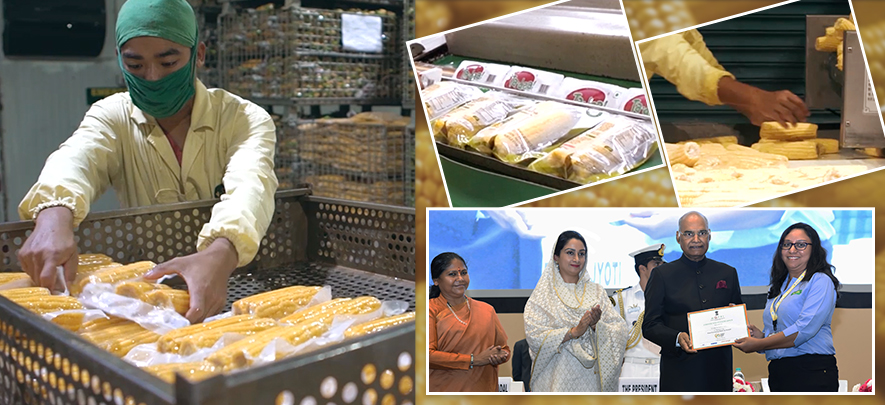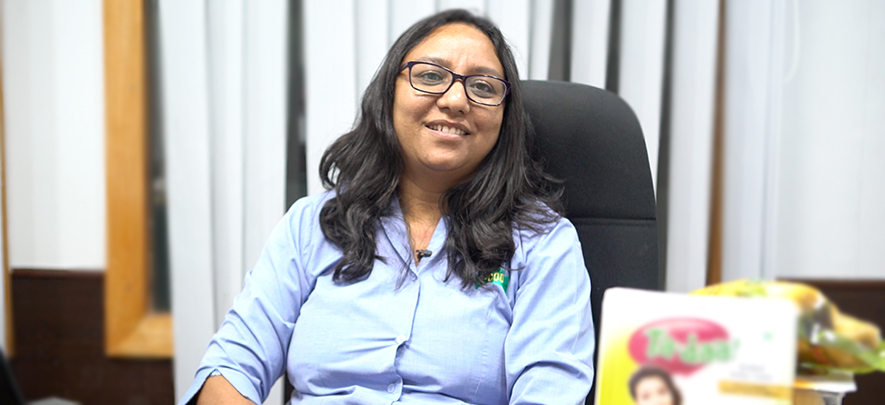Bengaluru technopreneurs innovating to extend shelf life of fresh produce
SME Inspirations
392 week ago — 8 min read
Gayathri Swahar is one of three friends who decided to pursue a dream of extending the shelf life of farm produce. They got together in Bengaluru and started Y Cook India Private Limited. Today, their products, fresh from the farm and free of pesticide, are boiled and packaged and can be stored at room temperature and have a shelf life of a year. They want to make the experience of cooking more fun by eliminating time-consuming activities like cleaning and boiling that can be tedious. Targeting the mass market and providing their 1,800 farmers with fair value for their produce is a cornerstone of their scaling business. Y-Cook has been recognised as one of the Top 3 Startups in World Food India 2017 & received the award from the President of India. They also got the award for ‘Health Brand of the Year – Food’ at the India Health and Wellness Summit and Awards, 2017.
In conversation with GlobalLinker (GL), Gayathri Swahar (GS) shares the journey of a company which could spark a food revolution. Watch this video for more:
GL: Tell us about your business.
GS: Y-Cook was started with the idea of extending the shelf life of farm produce. When we came up with the idea we applied for a technopreneur grant from the government of India. This was around 2010 and we were the highest awardee at that particular time. We developed a lot of products in that period.
We are creating a new category in the food space. We are talking about minimally processed food. Our vegetables are just boiled - no preservatives and additives. They can be stored in normal room temperature for up to one year. We do lentils, tubers and corn. Everything is boiled and ready to use.
I hold a doctorate in industrial sociology. I was with Nielsen earlier, in the consumer neuroscience division. We were three childhood friends who moved from Coimbatore to Bengaluru. We had the ambition of creating products in the food category that would provide good nutrition for the next generation. This was the dream and now it’s a reality.
Currently we have 73 employees with us, including shop-floor employees. We are blessed in the sense that we have a team that motivates us. Our team that depods kernels is mostly women earning a little more for their children and that is very motivating. We work with zero preservatives and there is truth in our assertion, and that rallies the team around us into being motivated.
Our B2C clients are convenience seeking women mainly and it’s a vast spectrum of people who get our products through retail outlets.
GL: What is the USP of your business?
GS: Everyone is looking for convenience. Everyone is time-pressed. But, when you buy a rava idli mix, you can only make rava idli - there is no customisability. It will not be amenable to any other dish. The ready to eat segment impacts on taste and the pride of women. We on the other hand provide on the boiled produce like ‘chana’. It is up to you to make humus, or chana chaat. You can customise it the way you want. It becomes a convenient product for the consumer.
Our product is sourced directly from the farm. You’ll have zero pesticide residue in our produce. We are compliant to non-GMO seeds. It is packed within one day of harvesting, so it is fresher than fresh and does not need refrigeration. This is the basic USP of the product.
GL: What are some of the milestones of your business?
GS: One of our biggest achievements is starting right from the soil. We have started with 1800 farmers across 35 districts and 4 states. We do the soil analysis for the farmers. We do counselling and training for the farmers to ensure that they follow global practices to ensure that there is zero pesticide residue in the produce. We provide them with the saplings and do the harvest and the farmer raises the plant. In the process of the contract farming, the farmer greatly benefits. Growth for the company can only be possible if the ecosystem grows. If a farmer has one acre of land we want them to earn INR 1 lakh for that area. We are close to that goal.
GL: What are the challenges you have faced in establishing your business?
GS: The challenges were not from a market perspective. When we launched new products, we had to educate customers. Our customers did not understand how our boiled products could be preserved for a whole year at room temperature without preservatives. From a challenge perspective, attracting good talent, negotiating with vendors to ensure we can provide affordable products were important. I always think of my maid. She is also a working woman and if she can go home and make a nutritional meal after opening a packet of our corn, that is the goal. Attracting talent, retaining the price point so it can be mass affordable and meeting up with our demand. These are the main challenges. Sometimes. as we export we cannot cater to the demand and we have to work on how to address that challenge.
GL: Do you believe that the ‘ease of doing business’ in Bengaluru has improved?
GS: Bengaluru is very welcoming for entrepreneurs. When you’re a small company you need support from an ecosystem. Many a times, in Bengaluru people are willing to take that credit risk for the entrepreneurs. It is a good environment for entrepreneurs to make the most of the money they have. It is considered to be elite to be an entrepreneur in Bengaluru. That motivates you on bad days. Bengaluru gets you going.
GL: What role do you feel GlobalLinker plays in connecting & assisting SMEs?
GS: What is challenging for many SMEs is to find cost-effective different measures. Many SMEs find it difficult to get a distribution or marketing network. They struggle to understand their vendors and how to advertise and so on. If you create an ecosystem of entrepreneurs who can connect to each other, that process of networking becomes easier and more trusted. Doing it another way, you would have to test the other person or organisation and the cost of failure would be very high. This is where GlobalLinker can make a difference because there is a trust component involved in it.
GL: What has been your experience as a woman entrepreneur?
GS: Women, if they get into entrepreneurship, they will be capable. They are built to multitask. When they have a baby, they know what to do. Women hesitate because they feel the cost of failure is greater for them than for men. There is a good chance of success for a woman, but she needs to take the plunge.
I have a 14 and two-year-old at home. There’ll be different needs. You can’t be an entrepreneur at home. You have to be a mother at home.
GL: What is your message to aspiring entrepreneurs?
GS: Life is about taking a risk. That’s what we did. One fine day we decided to just do it and found it was worth it. It was rewarding. We have always wanted to touch a million lives before we die. We discussed that sitting together as childhood friends.
Take the plunge. Nothing untoward will happen.
Network with Gayathri Swahar by clicking on the 'Invite' button on her profile.
Disclaimer: This article is based solely on the inputs shared by the featured member. GlobalLinker does not necessarily endorse the views, opinions & facts stated by the member.

Posted by
GlobalLinker StaffWe are a team of experienced industry professionals committed to sharing our knowledge and skills with small & medium enterprises.
Network with SMEs mentioned in this article
View GlobalLinker 's profile
Most read this week














Comments (1)
Share this content
Please login or Register to join the discussion